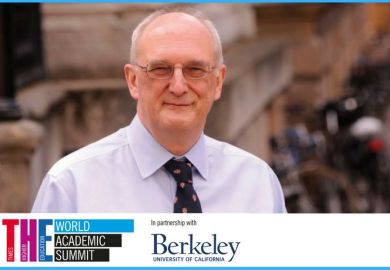Pre-register for the THE World Academic Summit 2017 at King's College London
Public higher education is “dying” in the US, with the pricing out of students from poorer backgrounds amounting to a “national tragedy in the making”, a leading academic has warned.
Delivering the opening keynote of the Times Higher Education World Academic Summit, held at the University of California, Berkeley, Robert Reich said that sector leaders urgently needed to combat the notion that getting a degree was a private – not a public – good.
Professor Reich, chancellor’s professor of public policy at Berkeley and secretary of labor in the Clinton administration, said that state funding for public higher education had decreased by 18 per cent since 2008.
While 70 per cent of US students are still educated in public universities, these institutions now face significant financial challenges, with Berkeley being no exception.
“Public higher education is dying in the US,” Professor Reich said. “If we stay on the path we are now on, there will be very little difference between public institutions and private institutions in terms of their funding, or their cost structures, or their tuition [fees].”
Professor Reich said that tuition fees at public universities had increased by 33 per cent since 2008. The result was, he said, that students from poor and lower-middle-class families could “no longer afford public higher education”.
“Higher education is becoming less affordable to many in the bottom 60 per cent just at a time when higher education is more necessary than ever before to succeed in the modern economy and just as inequality is widening more than it has ever widened in the US since the 1880s and 1890s,” he said. “Those three things together spell out, it seems to me, a national tragedy in the making.”
Professor Reich said that the problem was exacerbated by the fact that private higher education institutions were “not doing the job they ought to do” to respond to widening inequality. He said that tuition fees at these universities were increasing faster than inflation partly as a result of competition to attract the best academics and to build student facilities that made campuses “look like and function like country clubs”.
He highlighted that federal tax breaks for philanthropic donations meant that the indirect public subsidy for Princeton University now stood at $26,000 (£19,972) per student, compared to the direct subsidy of about $7,000 per student at Berkeley; despite the fact that Berkeley had more students whose background meant that they were eligible for federal subsidy than the entire Ivy League put together.
Professor Reich said that the US needed to recognise that, while graduates did earn significantly more, on average, higher education was also vital to support the critical thinking and public debate that underpinned the country’s democracy.
“The loss of that ideal, it seems to me, is a profound problem and a profound challenge to the US in the future and also to all of you who view the US and US higher education as a model for where your countries and your higher education systems wish to go,” he said. “We are leading the world right now in inequality, in terms of advanced economies, and we are leading the world right now in terms of inequality of access to higher education.
“It is vitally important that we reverse these directions, both of them, and they are intimately connected.”
Register to continue
Why register?
- Registration is free and only takes a moment
- Once registered, you can read 3 articles a month
- Sign up for our newsletter
Subscribe
Or subscribe for unlimited access to:
- Unlimited access to news, views, insights & reviews
- Digital editions
- Digital access to THE’s university and college rankings analysis
Already registered or a current subscriber?








